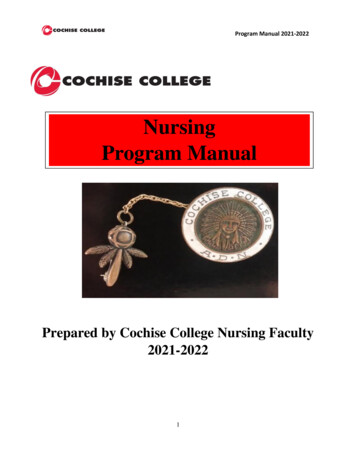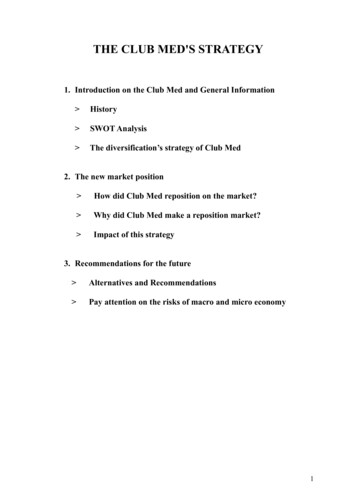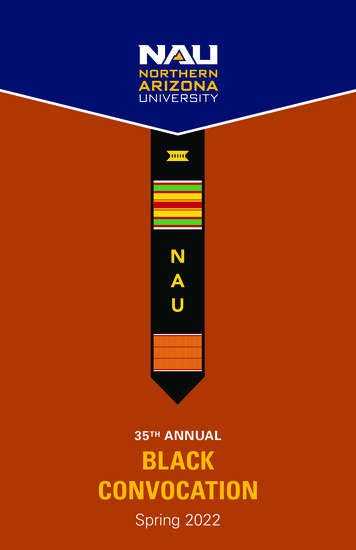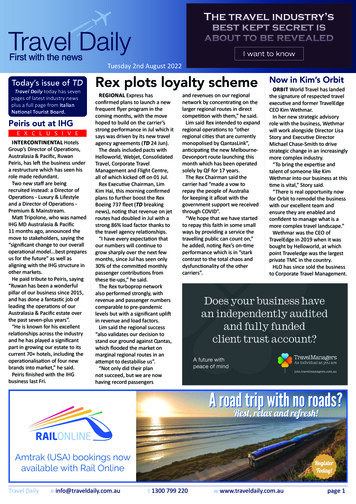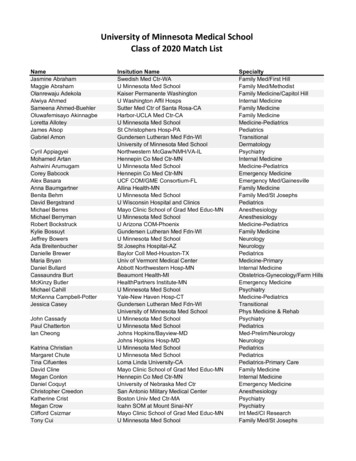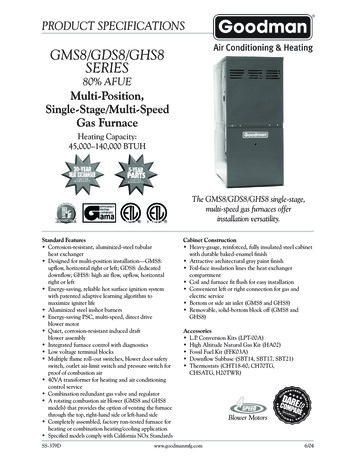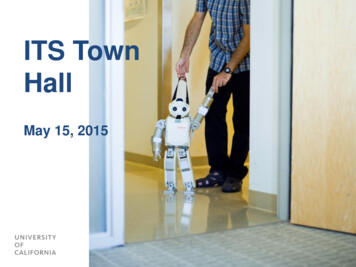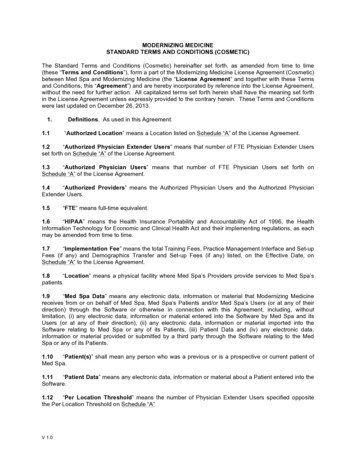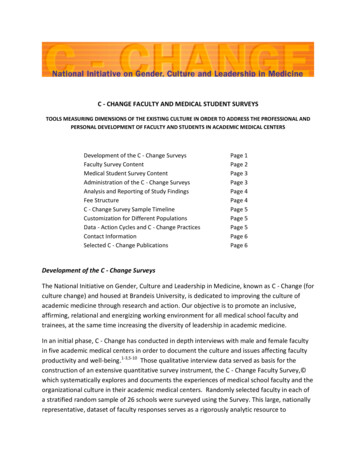
Transcription
C - CHANGE FACULTY AND MEDICAL STUDENT SURVEYSTOOLS MEASURING DIMENSIONS OF THE EXISTING CULTURE IN ORDER TO ADDRESS THE PROFESSIONAL ANDPERSONAL DEVELOPMENT OF FACULTY AND STUDENTS IN ACADEMIC MEDICAL CENTERSDevelopment of the C - Change SurveysFaculty Survey ContentMedical Student Survey ContentAdministration of the C - Change SurveysAnalysis and Reporting of Study FindingsFee StructureC - Change Survey Sample TimelineCustomization for Different PopulationsData - Action Cycles and C - Change PracticesContact InformationSelected C - Change PublicationsPage 1Page 2Page 3Page 3Page 4Page 4Page 5Page 5Page 5Page 6Page 6Development of the C - Change SurveysThe National Initiative on Gender, Culture and Leadership in Medicine, known as C - Change (forculture change) and housed at Brandeis University, is dedicated to improving the culture ofacademic medicine through research and action. Our objective is to promote an inclusive,affirming, relational and energizing working environment for all medical school faculty andtrainees, at the same time increasing the diversity of leadership in academic medicine.In an initial phase, C - Change has conducted in depth interviews with male and female facultyin five academic medical centers in order to document the culture and issues affecting facultyproductivity and well-being.1-3,5-10 Those qualitative interview data served as basis for theconstruction of an extensive quantitative survey instrument, the C - Change Faculty Survey, which systematically explores and documents the experiences of medical school faculty and theorganizational culture in their academic medical centers. Randomly selected faculty in each ofa stratified random sample of 26 schools were surveyed using the Survey. This large, nationallyrepresentative, dataset of faculty responses serves as a rigorously analytic resource to
National Initiative on Gender, Culture and Leadership in Medicine: C - Changeinvestigate important topics, such as the vitality and retention of academic faculty. Surveyfindings in individual institutions provide a solid foundation for developing activities to supportan enhanced working environment and set of values in academic medicine. Our nationalnormative C - Change Survey data allow medical schools to compare themselves with othersimilar institutions. Recent C - Change research identifies dimensions of the culture asmeasured by the survey that predict faculty intention to leave due to dissatisfaction,11mentoring and vitality, and differences in the experiences of faculty sub-populations.12-13 Thefaculty survey was later adapted for medical students and residents to measure theirperceptions of their learning environment and professionalism, and offers insights into the“hidden curriculum.”The C - Change Surveys are available for use by academic medical centers wishing to assess andimprove their culture and existing practices in order to create a more academically productive,inclusive, diverse and humanistic environment where all people can thrive. The Surveys allowdetailed exploration of the foundations of the development of human capital, (e.g., trust,relationships, perception of opportunity, professionalism and the learning environment) as wellas the waste of such human capital. (e.g., disconnection, causes of dissatisfaction, burnout, anddesire to leave academic medicine) When used in parallel, the Student and Faculty Surveysprovide credible and powerful tools for improvements. Survey findings can addressaccreditation requirements.Content of the C - Change SurveysC - Change Faculty Survey. The C - Change Faculty Survey assesses medical faculty perceptionsof their organizational culture and professional experiences. It consists of 74 questions thatassess levels of vitality, trust, competition, professionalism, feelings of being valued andbelonging, gender and diversity inclusion and equity, and other constructs related to theorganizational culture for faculty. It also collects data on faculty roles (e.g., percent time spentin research, education, administration, clinical time) and faculty perception of their school’ssupport for career development, mentoring and work-life management. It assesses burnoutand faculty commitment to their institution, as well as intention to leave academic medicine.Twelve discrete scales with demonstrated statistical reliability, developed to summarize C Change data along important dimensions of the culture, allow comparison of sub-populationsand investigate outcomes of interest. The 12 scales are:1.2.3.4.5.Vitality/EngagementSelf-Efficacy in Career AdvancementPerceptions of Institutional SupportRelationships, Inclusion, TrustPersonal and Institutional Values Alignment2 Pagehttp://cchange.brandeis.edu
National Initiative on Gender, Culture and Leadership in Medicine: C - Change6.7.8.9.10.11.Ethical and Moral DistressLeadership AspirationsGender EquityEquity for members of groups underrepresented in medicineWork-Life IntegrationPerception of Institutional Change Efforts for Diversity12. Perception of Institutional Change Efforts for Faculty SupportThe Faculty Survey can be used in its entirety or in short-form for the following purposes: assessment of the culture and faculty professional experiencescollection of data for accreditation purposesto identify areas for improvementprogram evaluationquality improvementto track the culture or special dimensions of the culturein modular format to focus on dimensions of particular interestas a pre/post measurement toolpulse data collectioncomparison of sub-populationsC - Change Medical Student Survey. The C - Change Medical Student Survey assesses thelearning environment and the development of professionalism among medical students. Itconsists of 38 questions that assess relationships, trust, feelings of being valued and belonging,ethical issues, gender and diversity equity, perception of their school’s support for careerdevelopment, and other constructs related to the professional development of students.Data from the C - Change Medical Student Survey are analyzed along a subset of the samedimensions as the faculty icacy in Career AdvancementPerceptions of Institutional SupportRelationships, Inclusion, TrustPersonal and Institutional Values AlignmentEthical and Moral DistressGender EquityEquity for Members of Groups Underrepresented in MedicineWork-Life Integration3 Pagehttp://cchange.brandeis.edu
National Initiative on Gender, Culture and Leadership in Medicine: C - ChangeAdministration of the C - Change SurveysBoth the C - Change Faculty Survey and the Medical Student Survey are fielded electronically.The C - Change Faculty Survey takes about 20 minutes to complete and the Medical StudentSurvey takes about 10 minutes. The Surveys are hosted on a secure external website andadministered by the C - Change team at Brandeis University to ensure confidentiality ofresponses and help achieve a high response rate. Data are provided to schools in aggregateform to protect the anonymity of respondents. If preferred, the Medical Student Survey can befielded in-house and/or in paper and pencil format.C - Change works closely with medical schools to understand any unique needs they might havein survey adaptation or fielding, and administers the Survey. C - Change works in collaborationwith each institution to develop a strong communications plan to enable a high response rate.Depending on the size and analytic needs of the institution, C - Change can recommend anddevelop a sampling plan or field the Survey to the full census of the faculty and students asappropriate.Analysis and Reporting of Study FindingsC - Change creates the scales representing dimensions of the culture and other analyticvariables of interest, and prepares data tables with frequencies for all survey variables. Nationalfaculty data are provided as comparison to help identify similarities and differences with thestudy institution.Fee StructurePricing of the C - Change Faculty Survey depends on study specifics, such as the size of the studypopulation, analysis of sub-populations, or customized benchmarking.The base survey price includes: consultation on institutional needspreparation and customization of the surveydesign of a sampling plancover lettersmanagement of e-mail communications with respondentselectronic fielding of the surveyfollow-up remindersdata analysisdata tables with institutional results and national data comparisonscompilation of respondent narrative comments4 Pagehttp://cchange.brandeis.edu
National Initiative on Gender, Culture and Leadership in Medicine: C - ChangeOptions available at additional cost are distribution and processing of paper surveys;customized analyses based on specific institutional interests; narrative summary report anddisplay of key findings in graphical format and PowerPoint.C - Change Survey Sample TimelineWeek 1Project launch discussion of scope of survey,population to survey, timing of surveyWeeks 2-3Survey customizedCommunications draftedSampling/e-mail specifications finalizedE-mail addresses provided to C - ChangeWeek 4Survey finalizedCommunications finalizedWeeks 5-7Survey in fieldWeek 8-10Data programming and analysis conductedWeeks 11Data tables with national comparisons deliveredWeeks 11-12Study debriefingC - Change will be pleased to work with you to customize a project and timeline that meetsyour institution’s needs.Customization for Different PopulationsThe Survey can be adapted for faculty in other health care disciplines and higher education, andfor staff.Consultation Services and C - Change SurveyAssisting institutions to collect and use their faculty survey data effectively and constructivelyare central elements of the services provided with the C - Change Survey. C - Change offersconsultation on implementing data-action cycles, i.e., change activities that are appropriate andresponsive to Survey findings.C - Change can conduct discussion groups, interviews and/or workshops with leaders orconstituent groups in the academic medical center for multiple purposes: For presentation of dataAs an engagement of stakeholder strategy5 Pagehttp://cchange.brandeis.edu
National Initiative on Gender, Culture and Leadership in Medicine: C - Change To address issues that emerge from the SurveyTo help formulate and implement change activitiesAs part of a needs assessment to collect in-depth information about aspects of theculturePlease contact Dr. Linda Pololi at lpololi@brandeis.edu or 781.736.8120 orcchange@brandeis.edu for further information about use of the C - Change Surveys.National Initiative on Gender, Culture and Leadership in Medicine: C - ChangeBrandeis University, Mailstop 079Waltham, MA 02454-9110Selected C - Change loli L, Conrad P, Knight S, Carr P. A study of the relational aspects of the culture of academic medicine.Academic Medicine. 2009;84:106-114.Carr P, Pololi L, Knight S, Conrad P. Collaboration in academic medicine: Reflections on gender andadvancement. Academic Medicine. 2009;84(10):1447-1453.Pololi L, Kern DE, Carr P, Conrad P, Knight S. The culture of academic medicine: Faculty perceptions of thelack of alignment between individual and institutional values. Journal of General Internal Medicine.2009;24(12):1289-95.Powell D, Scott JL, Rosenblatt M, Roth PB, Pololi L. Commentary: A call for culture change in academicmedicine. Academic Medicine. 2010;84:586-87.Conrad P, Carr P, Knight S, Renfrew MR, Dunn M, Pololi L. Hierarchy as a barrier to advancement for womenin academic medicine. Journal of Women’s Health. 2010;19(4):799-805.Pololi L, Kern DE, Carr P, Conrad P. Authors’ Reply: Faculty values. Journal of General Internal Medicine.2010;25(7):647.Pololi LH. Changing the Culture of Academic Medicine. Perspectives of Women Faculty. Hanover, NH:Dartmouth College Press; 2010.Pololi LH. A prescription for diversifying medical faculties. Chronicle of Higher Education. September 24,2010. B32-34.Pololi L, Cooper LA, Carr P. Race, disadvantage and faculty experiences in U.S. Academic Medicine. Journal ofGeneral Internal Medicine. 2010;25:1363-9.Pololi L.H, Jones S.J. Women Faculty: An analysis of their experiences in academic medicine and their copingstrategies. Gender Medicine. 2010;7:438-450.Pololi, LH, Krupat E, Civian JT, Ash AS, Brennan RT. Why are a quarter of faculty considering leavingacademic medicine? A study of their perceptions of institutional culture and intention to leave in 26representative medical schools. Academic Medicine. 2012;87:859-869.Pololi LH, Civian JT, Brennan RT, Dotollo AL, Krupat E. Experiencing the culture of academic medicine: gendermatters, a national study. J. of General Internal Medicine. 2013;28:201-207.Pololi LH, Evans AT, Gibbs BK, Krupat E, Brennan RT, Civian JT. The experience of minority faculty who areunderrepresented in medicine, at 26 representative U.S. medical schools. Academic Medicine.2013;88:1308-1314.Pololi LH, Krupat E, Schnell ER, Kern DE. Preparing culture change agents for academic medicine in a multiinstitutional consortium: the C - Change learning Action Network. J. Continuing. Education in the HealthProfessions. 2013;33:244-257Krupat E, Pololi LH, Schnell ER, Kern DE. Changing the culture of academic medicine: the C - Change LearningAction Network and its impact at participating medical schools. Academic Medicine. 2013;88:1252-1258.6 Pagehttp://cchange.brandeis.edu
lpololi@brandeis.edu or 781.736.8120 or cchange@brandeis.edu for further information about use of the C - Change Surveys. National Initiative on Gender, Culture and Leadership in Medicine: C - Change Brandeis University, Mailstop 079 Waltham, MA 02454-9110 . Selected C - Change Publications . 1. Pololi L, Conrad P, Knight S, Carr P.

